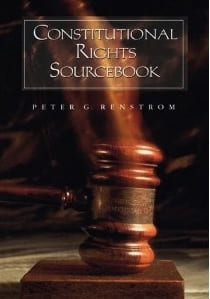The rights that are derived from the United States Constitution and Bill of Rights have come about through popular activism, war, and jurisprudence. As we are in the midst of election season, it is important to consider the origins of our rights as embodied in the Constitution, especially when we go to the polls to cast our votes for the leaders who we feel will best uphold the values that define our society.
Encyclopedia of the American Constitution, edited by Leonard W. Levy and Kenneth L. Karst
 This six-volume set contains entries on all matters relating to the United States Constitution, including profiles of key figures who influenced the interpretation of the Constitution (Charles Austin Beard), key interpretations that defined the role and powers of the Federal Government (American Insurance Company v. Canter), and issues that while they may not have anticipated in the Constitution as written, still rely on Constitutional interpretation (Abortion and the Constitution). This is a valuable reference for all who wish to see how the Constitution has been applied to key issues and cases throughout American history, as well as learn about the people who were instrumental in shaping interpretations that affect our daily lives.
This six-volume set contains entries on all matters relating to the United States Constitution, including profiles of key figures who influenced the interpretation of the Constitution (Charles Austin Beard), key interpretations that defined the role and powers of the Federal Government (American Insurance Company v. Canter), and issues that while they may not have anticipated in the Constitution as written, still rely on Constitutional interpretation (Abortion and the Constitution). This is a valuable reference for all who wish to see how the Constitution has been applied to key issues and cases throughout American history, as well as learn about the people who were instrumental in shaping interpretations that affect our daily lives.
GLEESON REFERENCE: KF4548 .E53 2000
Constitutional Rights Sourcebook by Peter G. Renstrom
 This volume is a concise compendium of information about rights contained in the United States Constitution, as well as the origins of these rights through interpretations of specific Constitutional amendments. The book is divided into sections that contain information about the relationship between the Constitution and the Supreme Court, sections on several of the amendments that have been key sources for interpretations of civil rights including entries on the rights interpretations that have been influenced by these amendments, and a section of legal words and phrases that are important for understanding civil rights. The book also contains appendices containing the full text of the Constitution, lists of all the Supreme Court justices through 1999, and the compositions of each Supreme Court from 1900-1999 organized by Chief Justice. This is an excellent guide for those who want to find information about civil rights law, interpretations and their origins.
This volume is a concise compendium of information about rights contained in the United States Constitution, as well as the origins of these rights through interpretations of specific Constitutional amendments. The book is divided into sections that contain information about the relationship between the Constitution and the Supreme Court, sections on several of the amendments that have been key sources for interpretations of civil rights including entries on the rights interpretations that have been influenced by these amendments, and a section of legal words and phrases that are important for understanding civil rights. The book also contains appendices containing the full text of the Constitution, lists of all the Supreme Court justices through 1999, and the compositions of each Supreme Court from 1900-1999 organized by Chief Justice. This is an excellent guide for those who want to find information about civil rights law, interpretations and their origins.
GLEESON REFERENCE: KF4550 .Z9 R463 1999
Encyclopedia of American civil liberties. Paul Finkelman, editor
 This three-volume encyclopedia contains information on all aspects of civil liberties in the United States, as they have come to be understood through interpretations of the Constitution and the Bill of Rights. Entries include biographical information on men and women, both jurists and lay people, who had an influence on our understanding of civil rights (Learned Hand). The encyclopedia also contains information on issues that we grapple with on a daily basis, such as hate speech and related laws, and theories that influence how courts come to the decisions that influence our civil liberties. This reference is invaluable, as in a free and open society, it is important not only to to study the issues where questions of civil liberty come into play, but to know how these decisions and interpretations that affect us every day first came into being.
This three-volume encyclopedia contains information on all aspects of civil liberties in the United States, as they have come to be understood through interpretations of the Constitution and the Bill of Rights. Entries include biographical information on men and women, both jurists and lay people, who had an influence on our understanding of civil rights (Learned Hand). The encyclopedia also contains information on issues that we grapple with on a daily basis, such as hate speech and related laws, and theories that influence how courts come to the decisions that influence our civil liberties. This reference is invaluable, as in a free and open society, it is important not only to to study the issues where questions of civil liberty come into play, but to know how these decisions and interpretations that affect us every day first came into being.
